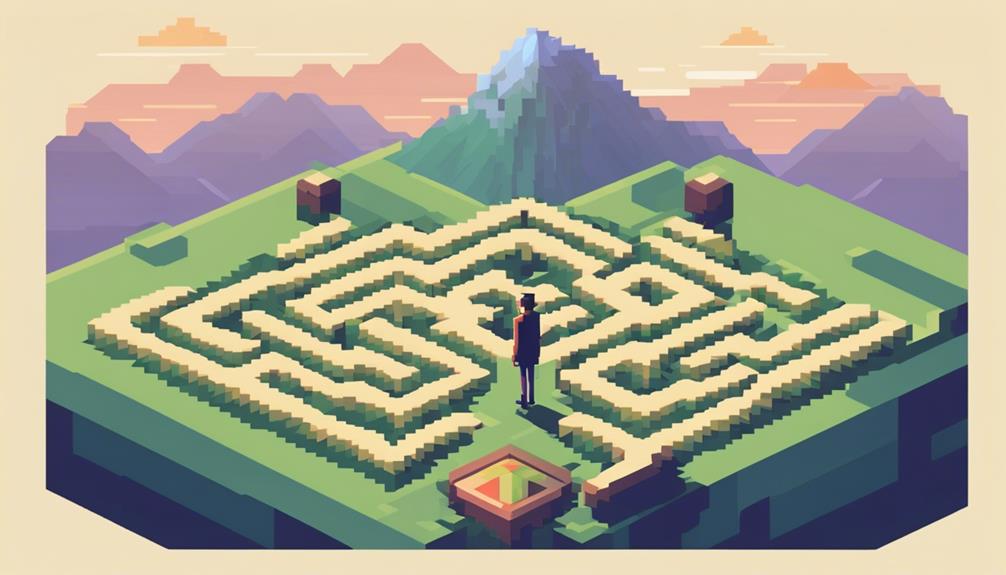You're investing time and effort into personal growth, but wonder if personal development and self-improvement are interchangeable terms. They're not. Personal development involves holistic growth, intrinsic motivation, and mindset shifts, focusing on self-awareness and long-term growth. Self-improvement, on the other hand, targets specific skills or behaviors with short-term achievements in mind, often relying on quick fixes or Band-Aid solutions. While they may overlap, personal development cultivates a deeper understanding of yourself and the world, whereas self-improvement tends to focus on external benchmarks. As you explore the nuances of growth, you'll discover more about how to harness your unique strengths and aspirations.
Key Takeaways
- Personal development and self-improvement are related but distinct concepts, with personal development focusing on holistic growth and intrinsic motivation.
- While self-improvement targets specific skills or behaviors with short-term achievements in mind, personal development cultivates a deeper understanding of oneself and the world.
- Personal development involves mindset shifts and individualized growth strategies, whereas self-improvement tends to focus on quick fixes or Band-Aid solutions.
- Effective personal growth strategies, such as brain dumping and mindful goal setting, prioritize inner self-awareness and continuous learning over external benchmarks.
- Personal development is a long-term, adaptive process that fosters resilience and motivation, whereas self-improvement may rely on standardized instant-fix approaches.
Defining Personal Development
As you set out on a journey of self-discovery, personal development becomes a vital aspect of your life, focusing on long-term growth and self-discovery that goes beyond mere surface-level changes.
This journey involves more than just making superficial improvements; it's about fostering a deeper understanding of yourself and your place in the world. Personal development is a holistic process that encompasses emotional intelligence, setting meaningful goals, and continuous learning. It's about adopting a growth mindset, making mindset shifts, and tailoring strategies to your individual needs. By doing so, you'll gain a deeper understanding of yourself, your strengths, and your weaknesses.
In contrast to self-improvement, which often focuses on quick fixes and external changes, personal development is a more profound and lasting process. It's about investing in your inner growth, rather than just trying to enhance your outer self.
As you commence on this journey, you'll come to realize that personal development isn't just about achieving success, but about becoming the best version of yourself. By prioritizing personal development, you'll be better equipped to handle life's challenges, build stronger relationships, and find a sense of purpose and fulfillment.
Understanding Self-Improvement

You shift your focus from nurturing inner growth to making targeted enhancements, recognizing that self-enhancement plays a distinct role in your journey of self-discovery. In this domain, you're driven to make specific adjustments to enhance your skills or behaviors. This process is often guided by external benchmarks for success, which helps you set clear, actionable goals for improvement. Unlike personal growth, which focuses on inner transformation, self-enhancement is more task-oriented and results-driven in nature. You're motivated to achieve short-term accomplishments and measurable outcomes, which can be incredibly empowering.
As you set out on this path, you'll find that self-enhancement is closely tied to self-development. While personal growth is about becoming a better version of yourself, self-enhancement is about refining your skills and abilities to achieve success in specific areas of your life. By understanding the distinct role of self-enhancement, you can harness its power to drive tangible progress and achieve your goals. By doing so, you'll be able to make targeted improvements that complement your personal growth, ultimately leading to a more fulfilling life.
Key Differences Between Both

Frequently, individuals conflate personal development and self-improvement, but distinct differences separate these two approaches to growth. As you explore these concepts, grasping the disparities between them is crucial.
Personal development focuses on holistic growth, encompassing self-awareness, emotional intelligence, and intrinsic motivation. You're driven to set meaningful goals that align with your values and passions.
In contrast, self-improvement targets specific skills or behaviors, often with short-term achievement in mind. You might rely on external benchmarks and measurable goals to gauge progress.
Personal development emphasizes mindset shifts and individualized strategies for growth, whereas self-improvement tends to focus on quick fixes or Band-Aid solutions. When you invest in personal development, you're cultivating a deeper understanding of yourself and the world around you. You're not just enhancing a skill or habit; you're transforming as a person.
Brain Dumping for Clarity

As you explore brain dumping for clarity, you'll want to understand the essentials of this technique, including how it helps clear mental clutter and boosts productivity.
By grasping these fundamental aspects, you'll be able to effectively harness brain dumping to achieve a clearer mind and improved focus.
Let's break down the key takeaways of brain dumping to reveal its full potential.
Brain Dumping Essentials
By flushing out mental clutter through brain dumping, individuals can access a sense of clarity and focus, paving the way for increased productivity and mental organization. This technique is an essential part of your inward journey towards self-development and self-improvement. By incorporating brain dumping into your daily routine, you'll be able to tackle tasks more efficiently and make room for personal growth.
There are various techniques to enhance the effectiveness of brain dumping. You can try mind mapping to visualize your thoughts, bullet journaling to organize your tasks, or list making to break down complex ideas. These techniques will help you declutter your mind and prioritize your tasks, allowing you to stay focused on what's important.
Clearing Mental Clutter
You clear mental clutter by dumping all your thoughts, ideas, and tasks onto paper, freeing yourself from the weight of mental overload and gaining clarity on what truly matters. This process, known as brain dumping, is an effective way to declutter your mind and prioritize tasks.
By putting your thoughts into words, you'll gain a better understanding of what's important and what's not. You'll begin to see what's holding you back and what's propelling you forward, helping you become a better version of yourself.
Regular brain dumping helps you stay focused on your goals and become the best version of yourself. Remember, words mean everything, and by writing them down, you'll be able to process and reflect on them more effectively.
Boosting Productivity
Clarity is the catalyst that sparks productivity, and brain dumping is the key to unlocking it. By releasing all your thoughts, tasks, and worries onto paper or a digital platform, you'll experience a significant reduction in stress and anxiety. This liberating process enhances your productivity and time management skills, providing a clear understanding of priorities and tasks.
Brain dumping also fosters creativity and problem-solving skills by freeing up mental space for innovative ideas. Once you've dumped your thoughts, categorize and prioritize tasks to ensure efficient management and completion. Regularly reviewing and updating your brain dump ensures ongoing mental organization and focus on key priorities.
Effective Personal Growth Strategies

Now that you've clarified your goals through brain dumping, it's time to develop effective personal growth strategies that work for you.
You'll want to incorporate these strategies into your daily routine, making them a habit that drives progress.
Brain Dumping Essentials
By harnessing the power of brain dumping, individuals can access a transformative tool for effective personal growth, paving the way for a more organized, focused, and productive life. This technique involves writing down thoughts, ideas, and tasks to declutter the mind, reducing mental clutter, stress, and anxiety while improving productivity and time management.
To get started with brain dumping, you can try the following essentials:
- Choose a method: Experiment with techniques like mind mapping, bullet journaling, list making, or digital tools to find what works best for you.
- Set a schedule: Regularly dedicate time to brain dumping, whether daily, weekly, or monthly, to maintain mental clarity and focus.
- Review and update: Periodically review your brain dump to categorize, prioritize, and manage tasks effectively.
- Make it a habit: Incorporate brain dumping into your daily routine to experience the benefits of a clearer, more organized mind.
Daily Routine Incorporation
As you cultivate a daily routine that incorporates brain dumping, you'll find that mental fog lifts, and a sense of control and direction takes hold. By making brain dumping a habit, you'll be able to tackle tasks more efficiently and make the most of your time.
Here's a breakdown of how you can incorporate brain dumping into your daily routine:
| Scenario | Benefits | Tips |
|---|---|---|
| Morning routine | Clears mental fog, sets priorities | Start with a 10-minute brain dump to clarify your day's goals |
| Stressful situations | Reduces anxiety, increases focus | Take a 5-minute break to brain dump and regain composure |
| Weekly planning | Organizes thoughts, sets goals | Set aside 30 minutes for brain dumping and planning |
Mindful Goal Setting
You'll take a significant step towards effective personal growth by setting specific, achievable goals that align with your personal values and aspirations through mindful goal setting. This approach involves reflecting on your current state and desired outcomes before setting goals, confirming they align with what truly matters to you. By doing so, you'll stay focused, motivated, and accountable throughout your personal growth journey.
Here are some key aspects of mindful goal setting to keep in mind:
- Specificity: Set specific goals that are clear and well-defined, avoiding vague aspirations.
- Alignment: Confirm your goals align with your personal values and aspirations, for a sense of purpose and direction.
- Breakdown: Break down larger goals into smaller, manageable tasks to track progress effectively.
- Reflection: Regularly reflect on your progress, making adjustments as needed to stay on track.
Integrating Self-Improvement Techniques

To successfully integrate self-improvement strategies into your daily life, pinpoint specific areas where you want to enhance your skills or behaviors and then set realistic, achievable goals. This will help you stay focused and motivated, ensuring you're working towards measurable progress and growth.
Consistency is key, so commit to regular practice and dedication to see significant improvements over time. By doing so, you'll experience increased productivity, effectiveness, and overall personal satisfaction.
If you're new to self-improvement strategies, consider seeking guidance from mentors or experts in the desired area of improvement. They can offer valuable insights, provide feedback, and help you refine your approach.
As you incorporate self-improvement strategies into your daily routine, you'll be actively working towards achieving your short-term goals and long-term aspirations. Remember, self-improvement is a continuous process, and it's vital to be patient, kind, and compassionate with yourself throughout your journey.
With persistence and dedication, you'll discover your full potential and experience the transformative power of self-improvement.
The Power of Self-Care Rituals

As you focus on personal growth, remember that taking care of yourself is vital to achieving your goals.
By prioritizing self-care, you'll be able to create space for mindful moments, nurture your inner peace, and ultimately, accelerate your growth.
Prioritizing Self-Care Time
By incorporating self-care rituals into your daily routine, you'll be better equipped to tackle life's challenges with a clear mind and a healthy body. Prioritizing self-care time is vital for maintaining physical, emotional, and mental well-being. It's crucial to establish balance in your life, and self-care rituals can help you achieve that.
Here are some benefits of prioritizing self-care time:
- Increases joy and fulfillment: Engaging in activities that bring you happiness and satisfaction can enhance your mood and energy levels.
- Reduces stress and anxiety: Self-care rituals can help soothe your mind and body, reducing feelings of stress and anxiety.
- Improves overall well-being: Participating in self-care activities releases feel-good hormones that promote overall well-being and happiness.
- Supports personal growth: Prioritizing self-care time amidst personal growth is essential for sustaining progress and well-being.
Embracing Mindful Moments
You cultivate a deeper sense of self-awareness when you carve out mindful moments in your daily routine, allowing yourself to fully immerse in the present and reap the benefits of self-care rituals. By incorporating these rituals into your daily life, you can experience a significant reduction in stress levels, as you engage in activities that bring you joy and fulfillment.
Self-care rituals release feel-good hormones like endorphins and oxytocin, which can boost your mood and overall well-being.
Prioritizing self-care amidst personal growth enhances your overall quality of life, allowing you to focus on what truly matters. Incorporating self-care rituals into your daily routine can lead to increased happiness and satisfaction, as you learn to prioritize your own needs and desires.
Nurturing Inner Peace
Cultivating inner peace becomes a natural byproduct when you consistently prioritize self-care rituals, allowing you to tap into a sense of calm and serenity that permeates every aspect of your life. By incorporating self-care into your daily routine, you can reduce stress and anxiety, promoting a deeper sense of relaxation and tranquility.
Here are a few ways self-care rituals can nurture inner peace:
- Releasing feel-good hormones: Engaging in activities that bring you joy and fulfillment can release endorphins, which help reduce stress and promote relaxation.
- Prioritizing your well-being: By making self-care a priority, you're acknowledging that your physical, emotional, and mental well-being is essential to your overall health and happiness.
- Creating a sense of balance: Incorporating self-care rituals into your daily routine can lead to a more balanced and fulfilling life, allowing you to tackle challenges with greater ease and confidence.
- Fostering mindfulness: Self-care rituals encourage you to be present in the moment, letting go of worries about the past or future and allowing you to fully engage with your surroundings.
Embracing Growth Mindset Shifts

As you navigate life's twists and turns, embracing a growth mindset becomes essential to discover your full potential. By adopting this mindset, you'll view challenges as opportunities for growth and learning, rather than threats to your ego.
You'll see setbacks as temporary and solvable, rather than permanent failures. Cultivating a growth mindset involves seeking feedback and continuously yearning for improvement. This mindset shift can lead to increased resilience, motivation, and overall well-being.
When you focus on growth, you'll be more open to new experiences and learning from your mistakes. You'll recognize that your abilities and intelligence can be developed, rather than being fixed.
This mindset will help you approach problems with a sense of curiosity and enthusiasm, rather than fear and anxiety. By embracing growth mindset shifts, you'll be better equipped to handle life's obstacles and stay committed to your personal development journey.
You'll become more adaptable, confident, and motivated to reach your full potential.
Navigating Goals and Motivation

Goals act as waypoints on your personal growth journey, lighting the way to self-awareness and development. They aid in keeping you focused and motivated, directing you towards a more rewarding life. However, understanding the subtleties of goal-setting in personal development versus self-improvement is crucial.
When steering goals and motivation, bear in mind the following:
- Intrinsic vs. Extrinsic Motivation: Your personal growth goals are fueled by a thirst for progress and self-awareness, while self-improvement goals are often driven by external pressures or rewards.
- Fluid vs. Rigid Goals: Personal growth goals tend to be more adaptable and comprehensive, while self-improvement goals are specific and quantifiable.
- Mindset Shifts vs. Behavioral Change: Personal growth promotes shifts in mindset and self-discovery, while self-improvement entails altering behaviors and attaining short-term outcomes.
- Tailored Strategies vs. Quick Fixes: Personal growth strategies are customized to your unique requirements, involving ongoing learning, whereas self-improvement may rely on standardized, instant-fix approaches.
Cultivating Holistic Transformation

You begin a journey of all-encompassing transformation when you prioritize fostering your inner self and delving into your passions. This path is not about quick fixes or superficial changes, but about nurturing a deep understanding of who you are and what motivates you. By focusing on personal development, you'll venture on a thorough self-discovery journey that aligns your actions with your core values.
Here's a snapshot of what all-encompassing transformation looks like:
| Aspect | Personal Development | Self-Improvement |
|---|---|---|
| Focus | Fostering inner self and exploring passions | Targeting specific skills or behaviors |
| Goals | Long-term growth and self-awareness | Short-term achievements and measurable outcomes |
| Approach | Continuous learning and self-assessment | Achieving external benchmarks and standards |
Frequently Asked Questions
Is Self-Improvement the Same as Personal Growth?
You're wondering if self-improvement is the same as personal growth. Honestly, they're not interchangeable terms. Self-improvement focuses on short-term skills, while personal growth is about holistic development and self-awareness, leading to long-term, intrinsic motivation.
What Is the Definition of Growth in Personal Development?
As you navigate life's labyrinth, growth is the North Star guiding you towards self-actualization, where you actively cultivate emotional intelligence, resilience, and purpose, ultimately blossoming into the best version of yourself.
What Is the Difference Between Self-Development and Personality Development?
You're wondering about the difference between self-development and personal development. Simply put, self-development is about embracing your authentic self, while personal development focuses on enhancing specific areas of your life, like career and relationships.
What's the Difference Between Improvement and Development?
You're building a house, and improvement is like adding a fresh coat of paint, whereas development is like laying a strong foundation – it's the difference between a superficial fix and a transformative overhaul that lasts.
Conclusion
As you reflect on your journey, imagine a puzzle coming together, pieces of self-awareness, growth, and transformation fitting into place.
You've navigated the nuances of personal development and self-improvement, embracing the power of clarity, rituals, mindset shifts, and holistic growth.
Now, envision your path forward, illuminated by the understanding that personal development is the umbrella, and self-improvement is one of its many essential components.
With this clarity, you're poised to access your full potential, and the puzzle of your growth is finally complete.









